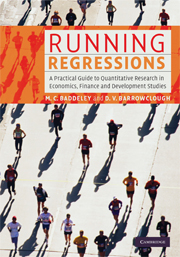 Running Regressions
Running Regressions Book contents
- Frontmatter
- Contents
- List of figures
- List of tables
- List of boxes
- Acknowledgements
- List of acronyms
- How to use this book
- Part I Simple regression and data analysis
- Part II Multiple regression and diagnostic testing
- Part III Time-series econometrics
- Part IV Advanced topics
- 11 Panel estimation
- 12 Binary dependent variables
- Index
- References
12 - Binary dependent variables
War and poverty
Published online by Cambridge University Press: 05 June 2014
- Frontmatter
- Contents
- List of figures
- List of tables
- List of boxes
- Acknowledgements
- List of acronyms
- How to use this book
- Part I Simple regression and data analysis
- Part II Multiple regression and diagnostic testing
- Part III Time-series econometrics
- Part IV Advanced topics
- 11 Panel estimation
- 12 Binary dependent variables
- Index
- References
Summary
Economic issues include:
Conflict and inequality
Institutions and development
Econometric issues include:
Binary dependent variable estimation
Logit and probit
Data issues include:
The Gini coefficient
The issue
Poverty and armed conflict are the norm for a large proportion of the world's poor. In moderating the socio-economic impacts of these conflicts, the military as an institution plays a complex role. It may bestow some benefits in countries with institutions that are otherwise underdeveloped and perhaps it is not surprising that a well-organised and powerful public institution, when engaged in peaceful activity, should have positive impacts in countries with otherwise underdeveloped institutions. A lot of empirical work has been done, following Benoit (1978), to show that defence spending necessitated by real or potential armed conflicts encourages the development of human skills and essential infrastructure within poor economies, thus alleviating poverty. Benoit's study led to a range of further studies, some of which questioned Benoit's methodology and findings, and others which investigated the relationship between defence and economic growth using different methodologies.
Whilst the military as an institution may have a positive impact in peacetime, what about the direct impacts of war and conflict? What are its causes and consequences? In this chapter we will start to illuminate these questions by assessing evidence about the relationship between the incidence of war and relative poverty.
- Type
- Chapter
- Information
- Running RegressionsA Practical Guide to Quantitative Research in Economics, Finance and Development Studies, pp. 264 - 279Publisher: Cambridge University PressPrint publication year: 2009


